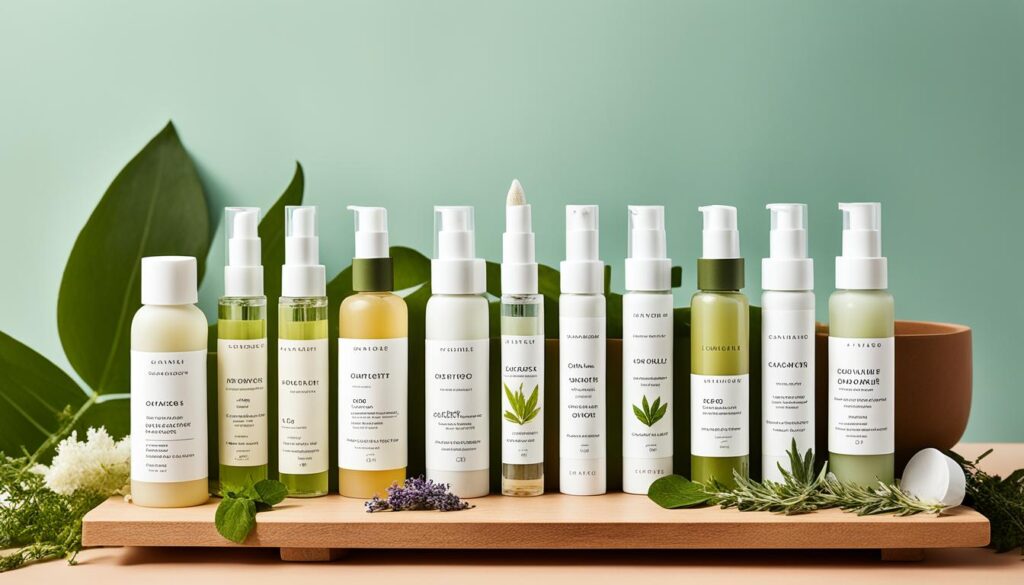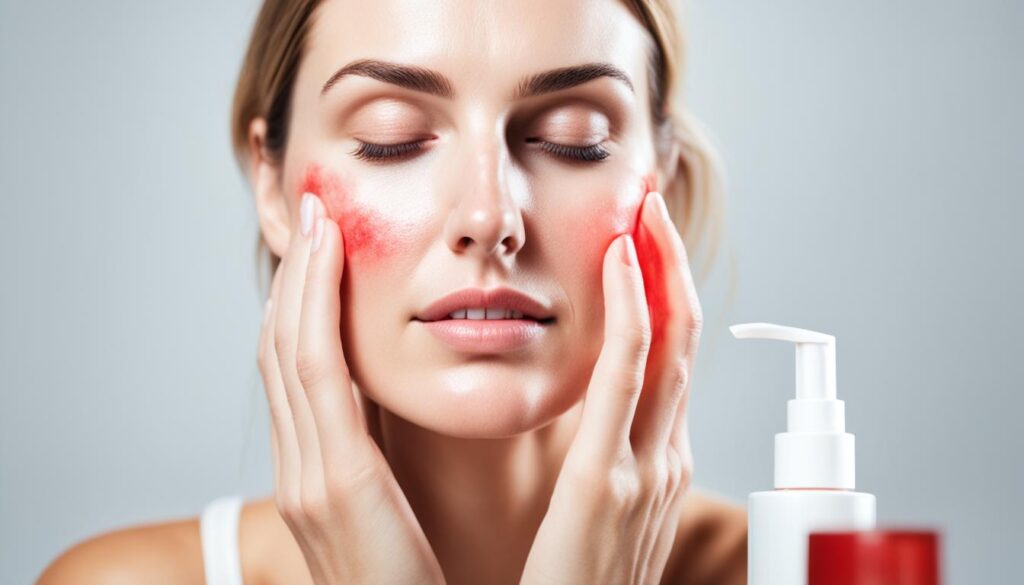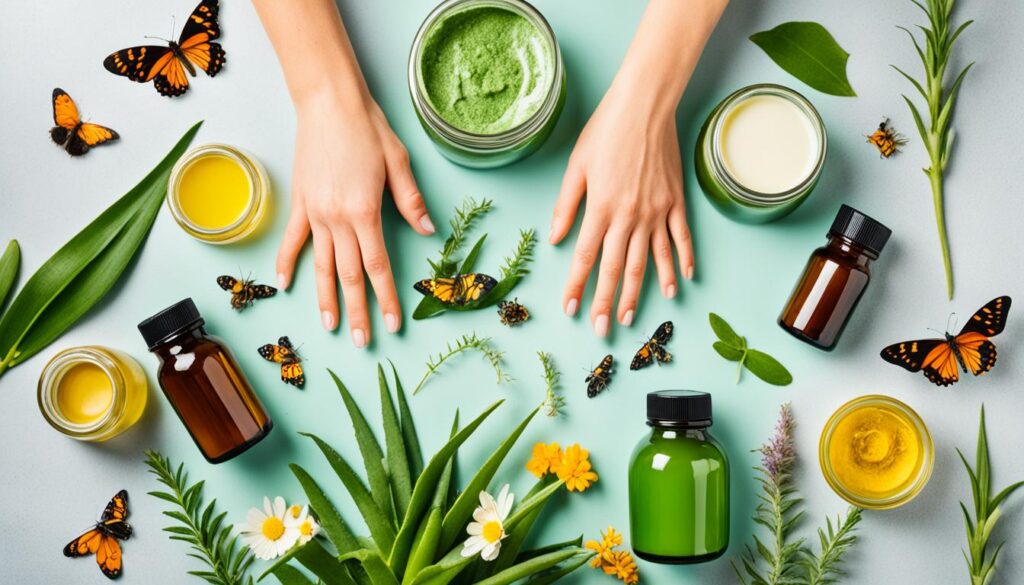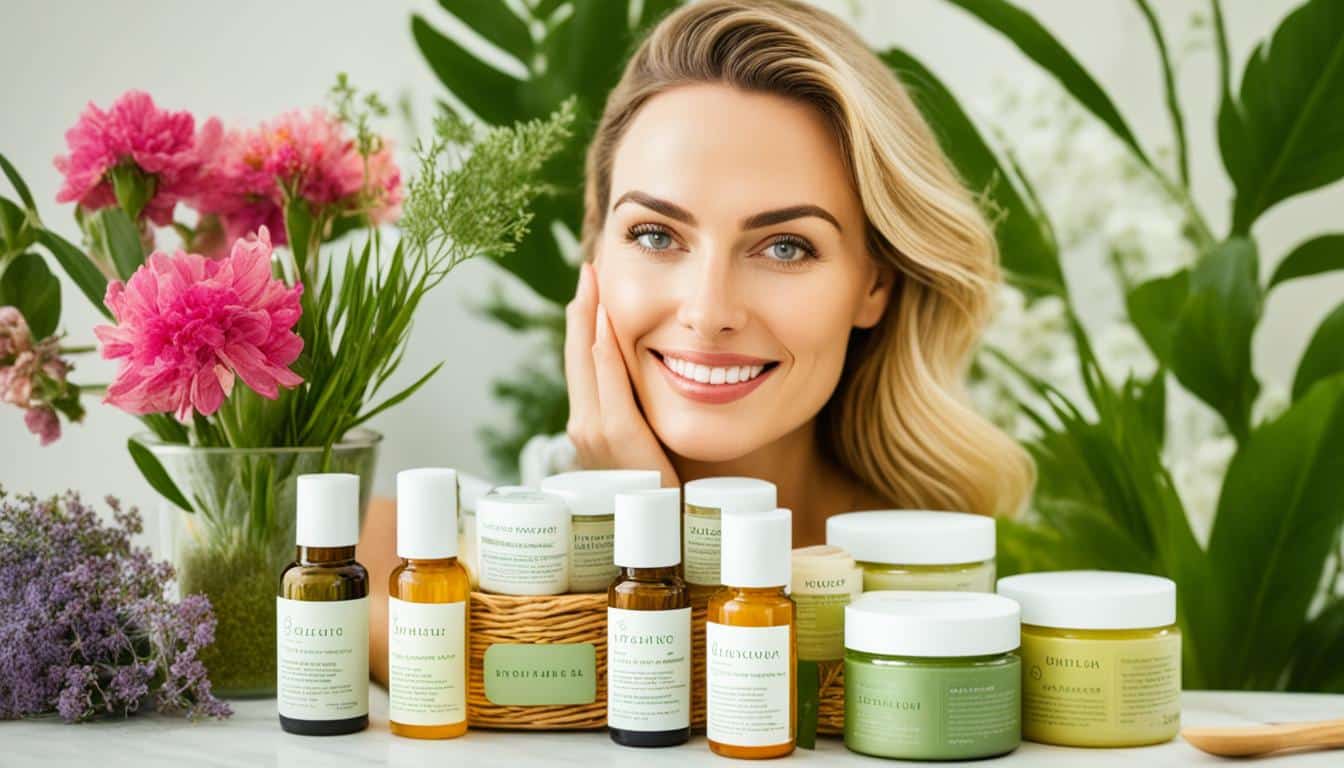Revitalize Naturally: Exploring Diverse Paths To Organic Skincare Routines
When it comes to our skincare routines, many of us are embracing a more natural approach. We are seeking organic skincare products and sustainable practices to nurture our skin and reduce our impact on the environment. In this article, we will delve into the world of natural skincare and explore a holistic approach to self-care.
Natural skincare is a philosophy rooted in using ingredients derived from nature to enhance the health and appearance of our skin. It emphasizes clean beauty and non-toxic skincare steps, promoting a mindful and conscious approach to our daily routines. By choosing eco-friendly beauty products and embracing green skincare practices, we can revitalize our skin naturally.
Understanding the impact of potentially harmful ingredients like parabens and sulfates is crucial in making informed choices for our skincare routines. By opting for organic and vegan products, we can experience the pure, unadulterated benefits of natural ingredients while supporting sustainable practices.
The beauty of natural skincare is its flexibility. DIY natural skincare remedies allow for customization and experimentation, empowering us to create personalized formulations. We can harness the power of botanical extracts, herbal infusions, and plant oils to boost our skin’s health and radiance.
As the seasons change, our skincare routines must adapt to meet the needs of our skin. A holistic approach accounts for the unique challenges and requirements presented by different times of the year. By making conscious choices and embracing diverse paths, we can achieve a sustainable skincare regimen that promotes radiant and healthy skin.
Key Takeaways:
- Organic skincare routines prioritize using ingredients derived from nature.
- Natural skincare embraces sustainable practices and promotes mindful self-care.
- Understanding the impact of harmful ingredients like parabens and sulfates is crucial.
- DIY natural skincare remedies allow for customization and experimentation.
- Adapting our skincare routines to seasonal changes is essential for optimal care.
Defining Natural Skincare and Its Benefits
Natural skincare is a holistic approach to caring for our skin, prioritizing the use of pure, unadulterated ingredients that are sourced from nature. Free from harsh chemicals, toxins, and artificial fragrances, natural skincare products harness the power of botanical extracts, plant oils, and herbal infusions to nurture and restore the skin’s health and vitality.
One of the core principles of natural skincare is embracing sustainable practices that promote biodiversity, ethical sourcing, fair trade, and cruelty-free methods. By using ingredients derived from sustainable sources, we contribute to the preservation of our planet’s ecosystems and support the well-being of local communities.
Choosing natural skincare is not just a matter of external beauty but also a reflection of our commitment to mindful self-care. By adopting a natural skincare routine, we cultivate a deeper connection with ourselves and the world around us. We become more conscious of the products we use, their origins, and their impact on our health and the environment.
“Natural skincare goes beyond surface-level care. It is an invitation to nourish our skin with kindness, to embrace the beauty and wisdom of nature, and to practice self-care in a mindful and compassionate way.” – Dr. Maya Patel, skincare expert.
When we prioritize natural skincare, we prioritize our well-being and that of our planet. It is a conscious choice to care for our skin with pure ingredients and to support practices that contribute to a more sustainable and ethical beauty industry. Let us explore the incredible world of natural skincare and unlock the transformative power of nature in our skincare journeys.
| Benefits of Natural Skincare |
|---|
| 1. Pure Ingredients |
| 2. Nurturing Botanical Extracts |
| 3. Rejuvenating Plant Oils |
| 4. Soothing Herbal Infusions |
| 5. Sustainable Practices |
| 6. Preservation of Biodiversity |
| 7. Ethical Sourcing |
| 8. Fair Trade |
| 9. Cruelty-Free Methods |
| 10. Mindful Self-Care |
Key Natural Ingredients and Their Skin Benefits
Natural skincare harnesses the power of various beneficial ingredients to provide nourishment and rejuvenation for the skin. These ingredients, derived from nature, offer a multitude of skin benefits. Let’s explore some key natural ingredients and their unique properties:
Aloe Vera
The gel extracted from aloe vera leaves is renowned for its soothing and hydrating properties. It helps to calm irritated skin, reduce inflammation, and provide essential hydration, making it an excellent ingredient for moisturizers and soothing gels.
Rosehip Oil
Rosehip oil, derived from the seeds of the rosehip fruit, is a powerful rejuvenating ingredient. Rich in vitamins and essential fatty acids, it helps to fade scars, promote skin regeneration, and improve the appearance of fine lines and wrinkles.
Tea Tree Oil
Tea tree oil is renowned for its antibacterial and antifungal properties. It is often used to fight acne and blemishes, effectively reducing inflammation and preventing further breakouts.
Hyaluronic Acid
Hyaluronic acid is a popular ingredient known for its intense hydration properties. It has the ability to retain moisture, resulting in plumper and more hydrated skin. This makes it ideal for moisturizers, serums, and other hydrating products.
Chamomile
Chamomile is widely recognized for its calming and soothing properties. It helps to reduce skin redness, irritation, and inflammation, making it a gentle and effective ingredient for sensitive skin.
Green Tea
Green tea is packed with antioxidants that protect the skin from environmental damage, such as pollution and UV radiation. It helps to neutralize free radicals, reducing the signs of aging and promoting a youthful complexion.
Jojoba Oil
Jojoba oil is a natural moisturizer that closely resembles the skin’s sebum. It helps to balance oil production, making it suitable for both dry and oily skin. Jojoba oil also has antioxidant properties that promote healthy skin.
Shea Butter
Shea butter is a rich and nourishing ingredient that deeply moisturizes the skin. It is packed with vitamins and essential fatty acids, helping to improve skin elasticity, soothe dryness, and enhance the skin’s natural barrier function.
Argan Oil
Argan oil, derived from the kernels of the argan tree, is rich in antioxidants and essential fatty acids. It offers unique benefits for different skin concerns, including hydration, anti-aging, and reducing the appearance of scars and stretch marks.
These natural ingredients provide a wide range of skin benefits, from soothing and hydrating to rejuvenating and protecting. Incorporating products that feature these ingredients can enhance your skincare routine and promote healthier, more radiant skin.
To further understand the benefits of these natural ingredients, let’s take a closer look at their specific properties and how they can enhance your skincare routine:
The Role of Organic and Vegan Products in Natural Skincare
Organic skincare and vegan skincare play significant roles in promoting natural, sustainable, and ethical practices within the beauty industry. These products prioritize both skin health and the well-being of the planet and its inhabitants. Organic skincare involves using ingredients sourced from organic farming, which means they are cultivated without the use of synthetic pesticides and fertilizers that could potentially harm the environment and our skin. Vegan skincare goes a step further by excluding any animal-derived ingredients, aligning with a compassionate lifestyle that respects animal rights.
By choosing organic and vegan skincare products, you can enjoy the benefits of natural, unadulterated formulations while supporting the sustainable farming practices and fair trade. Organic farming methods promote biodiversity, reduce water pollution, and contribute to soil conservation. They also help in reducing the carbon footprint and protecting ecosystems, making it a more sustainable choice. Similarly, vegan skincare products that are cruelty-free ensure that no harm is caused to animals during the manufacturing process.
Understanding the importance of ethical sourcing and fair trade is vital when exploring the world of organic and vegan skincare. Ethical sourcing ensures that the raw materials used in skincare products are obtained in an environmentally and socially responsible manner. Fair trade practices, on the other hand, empower farmers and workers in developing countries by providing them with fair wages and safe working conditions. By supporting brands that prioritize these values, you can contribute to a more just and equitable skincare industry.
Whether you choose organic, vegan, or a combination of both, these skincare products offer a range of benefits. They are crafted with natural, plant-based ingredients that are rich in vitamins, minerals, antioxidants, and other essential nutrients, providing nourishment and rejuvenation to your skin. By avoiding harsh chemicals and synthetic additives, these products minimize the risk of skin irritations and allergies, making them suitable for sensitive skin types.
In summary, embracing organic and vegan skincare products is not only beneficial for your skin but also for the environment and ethical practices. These products are natural, unadulterated, and sustainable, giving you the confidence of embracing a holistic and conscious approach to your skincare routine.

Understanding the Impact of Parabens and Sulfates
Parabens and sulfates are commonly used ingredients in skincare products that have raised concerns among consumers. It is important to understand the potential health risks associated with these synthetic preservatives and foaming agents.
The Potential Health Risks of Parabens
Parabens, such as methylparaben and propylparaben, are frequently used as preservatives in cosmetics and personal care products. They help prevent the growth of bacteria, mold, and yeast, extending the shelf life of these products. However, studies have shown that parabens can have potential health risks, including endocrine disruption.
Endocrine disruptors interfere with the normal functioning of hormones in the body, which can lead to various health issues. Parabens have been found to mimic estrogen, a hormone that plays a crucial role in the body’s reproductive system. This mimicry can disrupt hormonal balance and potentially contribute to the development of certain health conditions.
The Drying and Irritating Effects of Sulfates
Sulfates, such as sodium lauryl sulfate (SLS) and sodium laureth sulfate (SLES), are commonly used as foaming agents in skincare and haircare products. They create a rich lather that gives the illusion of effective cleansing. However, sulfates can strip the skin of its natural oils, leading to dryness and irritation.
When the skin’s natural oils are removed, it can disrupt the skin’s moisture barrier and leave it feeling tight, dry, and prone to irritation. This can be especially problematic for those with sensitive skin or conditions like eczema or psoriasis.
Choosing Paraben-Free and Sulfate-Free Options
To avoid the potential health risks associated with parabens and the drying effects of sulfates, it is recommended to choose skincare products that are labeled as paraben-free and sulfate-free.
Instead of synthetic preservatives, look for products that use natural preservatives such as tocopherol (vitamin E), rosemary extract, or grapefruit seed extract. These alternatives are gentler on the skin while still effectively preserving the product.
For cleansing agents, opt for gentle alternatives like coconut-derived surfactants or plant-based options such as soapwort extract or chamomile extract. These cleansers effectively remove impurities without stripping the skin of its natural oils.
By choosing paraben-free and sulfate-free skincare products, you can minimize the potential health risks associated with these ingredients and promote healthier, more balanced skin.

| Parabens | Sulfates |
|---|---|
| Potential health risks | Drying effects |
| Endocrine disruption | Irritation |
| Alternatives with natural preservatives | Gentle cleansing agents |
DIY Natural Skincare Remedies
Embrace the power of nature and create your own personalized skincare formulations with DIY natural skincare remedies. Using fresh ingredients and ancient remedies, you can tailor your skincare routine to meet your skin’s specific needs. With a wide range of home recipes for cleansers, masks, and moisturizers, you can achieve healthy and radiant skin using natural ingredients.
When it comes to DIY skincare, the possibilities are endless. Incorporate ingredients like raw honey, aloe vera gel, bentonite clay, avocado, honey, and coconut milk into your recipes for added nourishment. These natural ingredients are known for their hydrating, cleansing, and antioxidant properties, making them perfect for homemade skincare products.
Benefits of DIY Natural Skincare
DIY natural skincare offers several benefits:
- Control over ingredients: You have the freedom to choose the specific ingredients that work best for your skin, ensuring that you avoid any potential irritants or allergens.
- Personalized formulations: Customize your skincare products according to your skin type and concerns. Whether you have dry, oily, or sensitive skin, DIY allows you to craft personalized solutions.
- Ancient remedies: Many DIY skincare recipes draw inspiration from ancient practices, such as Ayurveda and traditional herbal medicine. These remedies have been used for centuries to promote healthy and glowing skin.
- Cost-effective: DIY skincare is often more budget-friendly compared to commercial products. Most ingredients can be found in your kitchen or purchased at an affordable price.
Safety Precautions and Best Practices
While DIY skincare can be enjoyable and effective, it is essential to follow safety precautions and best practices:
- Always conduct a patch test: Before using any new ingredient or recipe on your face, perform a patch test on a small area of your skin to check for any negative reactions.
- Use clean and sterilized tools: Ensure that all utensils, containers, and equipment used in your DIY skincare routine are thoroughly cleaned and sterilized to prevent contamination.
- Follow recipes and measurements: Stick to the recommended measurements and instructions in your DIY skincare recipes to achieve the desired consistency and effectiveness.
- Store properly: Store your homemade skincare products in appropriate containers, away from sunlight and moisture, to maintain their freshness and potency.
By following these safety precautions and best practices, you can enjoy the benefits of DIY natural skincare while ensuring the safety and effectiveness of your homemade products.

As you embark on your DIY skincare journey, remember to have fun and experiment with different ingredients and formulations. Take advantage of the vast array of essential oils, herbs, and natural ingredients available to create unique and effective skincare products that are tailored to your skin’s needs.
Creating a Sustainable Skincare Routine
When it comes to skincare, incorporating natural ingredients and adopting sustainable practices can make a significant difference. By creating a sustainable skincare routine, you not only nourish your skin with quality ingredients but also contribute to the well-being of the environment. Here’s how you can create an effective and eco-friendly skincare routine:
- Cleanse: Start your routine by cleansing your skin with a gentle cleanser. Look for products that contain natural ingredients and avoid harsh chemicals that can be harmful to both your skin and the environment.
- Tone: After cleansing, tone your skin using an alcohol-free toner. This helps balance the pH level of your skin and prepares it for the next steps in your routine.
- Moisturize: Hydrate and nourish your skin with moisturizers that contain nourishing oils like olive, coconut, or jojoba oil. These natural oils provide essential hydration and help maintain the skin’s balance.
- Sunscreen: Protect your skin from harmful UV rays by applying sunscreen every day. Look for mineral-based sunscreens that use natural ingredients like zinc oxide or titanium dioxide.
- Treatments: Incorporate treatments like serums or masks into your routine to address specific skin concerns. Choose products with natural ingredients that offer targeted benefits.
By following this sustainable skincare routine, you embrace the power of natural ingredients while minimizing package waste. Making conscious choices and opting for products with eco-friendly packaging can help reduce your environmental impact.
“A sustainable skincare routine not only benefits your skin but also contributes to a cleaner, greener future.”

| Benefit | Natural Ingredient |
|---|---|
| Hydration and balance | Nourishing oils (olive, coconut, jojoba) |
| Antioxidant protection and brightening | Vitamin C |
| Soothing and hydration | Aloe vera |
Choosing natural ingredients, such as nourishing oils, vitamin C, and aloe vera, allows you to provide the best care for your skin while being mindful of the planet. Sustainable skincare is all about making conscious choices, using quality ingredients, and reducing waste.
Example Skincare Routine Using Natural Ingredients
Creating a skincare routine using natural ingredients is an essential step towards achieving healthy and radiant skin. With the help of expert recommendations, you can establish an easy-to-follow routine that caters to your sensitive and oily skin while incorporating the benefits of natural and vegan ingredients.
Cleanse
To start your skincare routine, cleanse your face with a gentle cleanser formulated with natural ingredients. This will help remove dirt, excess oil, and impurities without stripping your skin of its natural moisture. Look for organic cleansers that contain soothing extracts like chamomile or green tea to calm and purify your skin.
Tone
After cleansing, use an alcohol-free toner to restore your skin’s pH balance and prepare it for the next steps of your routine. A toner with natural ingredients such as aloe vera or chamomile will help hydrate and soothe your skin, leaving it refreshed and revitalized.
Moisturize
Moisturizing is an essential step in any skincare routine, especially for sensitive and oily skin. Choose a lightweight moisturizer that contains nourishing plant-based oils like jojoba or argan oil. These natural ingredients will replenish moisture without clogging pores or causing greasiness. Opt for a vegan moisturizer to ensure it aligns with your ethical values.
Sunscreen
Protecting your skin from harmful UV rays is crucial for overall skin health. Apply a broad-spectrum sunscreen with a minimum SPF of 30 to shield your skin from sun damage and prevent premature aging. Look for a sunscreen that uses mineral-based ingredients like zinc oxide or titanium dioxide for a natural and vegan option.
Treatments
Incorporating treatments into your skincare routine can address specific concerns and enhance your skin’s appearance. Serums enriched with natural antioxidants like vitamin C can brighten your complexion and protect against environmental stressors. Additionally, weekly masking with natural ingredients such as clay or botanical extracts can purify, nourish, and revitalize your skin.
Also Read:- Glamour Unveiled: Decoding Celebrity Beauty Secrets For Radiant Red Carpet Looks
Remember, consistency is key when it comes to skincare routines. Follow these expert-recommended steps using natural and vegan ingredients tailored for sensitive and oily skin. Customize your routine based on individual needs, and enjoy the benefits of clean, sustainable, and expert-recommended skincare.
| Cleanse | Gently cleanse your face with a natural cleanser containing soothing extracts like chamomile or green tea. |
|---|---|
| Tone | Restore your skin’s pH balance and prepare it for further treatment by using an alcohol-free toner with natural ingredients. |
| Moisturize | Hydrate and nourish your skin with a lightweight moisturizer enriched with plant-based oils like jojoba or argan oil. |
| Sunscreen | Protect your skin from harmful UV rays by applying a broad-spectrum sunscreen with a minimum SPF of 30. |
| Treatments | Enhance your skincare routine with serums containing natural antioxidants and weekly masking with clay or botanical extracts. |

Conclusion
Embracing an organic skincare routine is a powerful way to prioritize both our skin health and the well-being of the planet. By choosing natural and sustainable practices, we can enjoy the benefits of nourishing ingredients while minimizing our impact on ecosystems. The use of organic and vegan products ensures that we are supporting ethical values and promoting a conscious and environmentally friendly beauty routine.
By taking a holistic and natural approach to skincare, we can revitalize our skin naturally, resulting in a radiant and healthy complexion. The combination of organic skincare routine, natural skincare routine, clean beauty routine, and sustainable skincare regimen allows us to harness the power of nature and experience the transformative effects it can have on our skin.
So, let us embark on this journey towards a more conscious and sustainable skincare regimen. Let us choose organic and vegan products, incorporate clean beauty practices, and prioritize natural ingredients. By doing so, we not only care for our skin but also contribute to the preservation of our environment, promoting a healthier and more sustainable future for ourselves and the generations to come.
FAQs
Q: What is a natural skincare routine?
A: A natural skincare routine involves using products made from natural ingredients to cleanse, moisturize, and treat the skin without harsh chemicals or synthetic additives.
Q: How can I determine the best natural skincare routine for my skin?
A: To find the best natural skincare routine for your skin, consider your skin type, concerns, and goals. You may need to experiment with different products to see what works best for you.
Q: What are some common skin issues that a natural skincare routine can address?
A: A natural skincare routine can help with various skin issues such as dry skin, uneven skin tone, acne-prone skin, sensitivity, and aging skin.
Q: How can I remove dead skin cells naturally?
A: You can remove dead skin cells naturally by exfoliating regularly using gentle scrubs, chemical exfoliants like AHAs or BHAs, or natural ingredients like oatmeal or sugar.
Q: What are some key steps in a natural skincare routine?
A: Key steps in a natural skincare routine include cleansing, toning, moisturizing, and using treatments like serums or masks, tailored to your skin’s needs.
Q: Can a natural skincare routine work for all skin types?
A: Yes, a natural skincare routine can be adapted to work for all skin types, whether you have oily, dry, combination, or sensitive skin.
Q: How can I create a natural beauty routine using organic products?
A: To create a natural beauty routine, look for organic skincare products that are free from harsh chemicals, artificial fragrances, and synthetic ingredients, focusing on natural and plant-based alternatives.
Q: What is a skin care routine and why is it important?
A skin care routine is a regular regimen that involves caring for your skin type using appropriate products and techniques. It is important to maintain a consistent routine to address specific skin concerns, protect the skin from environmental damage, and promote overall skin health.
Q: How do I determine my skin type?
Knowing your skin type is crucial for developing an effective skin care regimen. Common skin types include dry skin, oily skin, combination skin, and sensitive skin. You can identify your skin type based on how your skin looks and feels throughout the day.
Q: What are the benefits of using natural skincare products?
Natural skincare products are formulated with natural ingredients that are gentle on the skin and free from harsh chemicals. They can help nourish your skin, hydrate the skin, and protect the skin from the inside out, promoting glowing skin and preventing issues like acne and skin cancer.
Q: How can I create the best natural skin care routine?
To establish the best natural skin care routine, consider your skin type and concerns, and select best natural skincare routine products that address your specific skin concerns. Customize your daily routine with products that contain ingredients suitable for skin tone and needs.
Q: What are some tips for following a natural beauty routine?
When following a natural beauty routine, focus on using natural makeup and natural skincare products to maintain a healthy skin care regimen.
